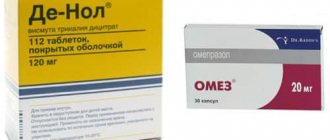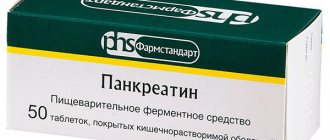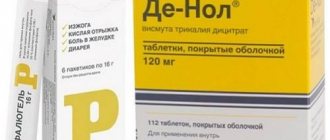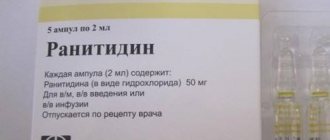Mechanism of therapeutic effect
The main mechanism of action of omeprazole is the suppression of the function of a special enzyme - sodium-potassium ATPase. The enzyme is conventionally called a proton pump or proton pump. The enzyme is actively involved in the production of hydrochloric acid molecules in the stomach.
Hydrochloric acid is synthesized by the parietal or parietal glands of the stomach. The process requires a lot of energy.
Omeprazole penetrates into places in the stomach where ATPase accumulates and actively inhibits it. It is not omeprazole itself that has a pharmacological effect, but its chemical derivative, sulfenamide. Omeprazole acts as a precursor to a pharmacological substance. The tetracyclic sulfenamide formed from the drug inhibits the activity of the enzyme by binding to its cysteine groups. At the same time, the activity of the proton pump is blocked, and the production of hydrochloric acid molecules is reduced.
Increased production of hydrochloric acid contributes to the development of the inflammatory process and self-digestion of the stomach walls. Omez is taken for gastritis as a remedy that protects the walls of the stomach from aggressive hydrogen and chlorine ions.
How to take the medicine
The drug is available in the form of capsules in a gelatin shell. Each capsule contains 20 mg of active ingredient. The packaging includes instructions for use for gastritis.
To cure gastritis, you should take omeprazole capsules for 1-2 weeks. The daily dosage of Omez for gastritis is 1 capsule (20 mg).
Admission rules
Before starting therapy, you should consult with your doctor about taking the drug in a particular case.
For gastritis, omez is taken half an hour before meals. The drug substance is absorbed in the gastrointestinal tract, the maximum effectiveness of the effect occurs after approximately 4 hours. Such a scheme for taking capsules helps reduce excess secretion of hydrochloric acid by parietal cells. When secretion is normalized, discomfort in patients disappears.
If the cause of the disease is the microorganism Helicobacter pylori, antibacterial drugs are prescribed simultaneously with taking Omez for 14 days.
If you missed an appointment
If you miss taking the drug Omez for gastritis, you should not take a double dose next time, it is dangerous for your health! It is better to consult with your doctor regarding the dosage regimen, how to take the medicine in an individual case, and whether it is permissible to increase or decrease the dosage.
Precautionary measures
Before you start taking Omez, you must undergo an examination and consult with a gastroenterologist. Before and after the course of treatment, the patient will need to undergo endoscopic diagnostics. This will eliminate the presence and possibility of development of malignant neoplasms. This is due to the fact that while taking Omez, the clinical symptoms of tumor processes can be suppressed, so identifying pathology will be much more difficult.
The drug must be taken for the period prescribed by the doctor. Usually, symptoms disappear much earlier than the disease itself, so improvement in well-being is not a reason to interrupt drug therapy. If the patient does not observe visible changes, but, on the contrary, his condition worsens, it is better to consult a specialist.
Pregnancy is not a contraindication to the use of Omez. The active substance does not have a mutagenic or teratogenic effect on the fetus. However, the effect of the drug on the course of pregnancy and fetal health has not been fully studied. Many patients notice a significant improvement in their well-being within a few days after starting treatment.
After a full treatment course, the inflammatory reaction subsides. Because of this, many patients begin to abuse the medicine and take it for a longer period than was recommended by the doctor. This is strictly forbidden. Self-medication can seriously harm your health. Long-term use of Omez helps reduce the absorption of vitamin B12.
This complication manifests itself in the form of the following symptoms:
- seizures in the corners of the mouth;
- burning tongue;
- pale skin;
- fast fatiguability;
- feeling of goosebumps crawling all over the body.
In addition, uncontrolled use of the drug is fraught with magnesium deficiency. This can lead to seizures and disturbances in the functioning of the heart. Despite the safety of the drug, the instructions contain a list of contraindications. These include:
- individual intolerance to active substances;
- age up to twelve years;
- brain tumors;
- intestinal obstruction;
- simultaneous use with nelfiravine.
During treatment with this drug, the likelihood of salmonella infection increases. The product masks the signs of cancerous tumors, so before treatment it is necessary to exclude their presence. The medicine is well tolerated by patients. However, in rare cases, side effects may occur:
- allergic reactions: rash, itching, bronchospasm. In severe cases, anaphylactic shock may develop;
- urticaria, dermatitis;
- arthritis, fractures, muscle pain;
- dizziness;
- headaches, depression, sleep disturbances, hallucinations;
- nephritis;
- abdominal pain, diarrhea, vomiting, flatulence;
- stomatitis, change in taste perception;
- fungal infections.
https://youtu.be/pM82XPUesk8
Omez in the treatment of gastritis
The effect of the drug for gastritis begins 2 hours after administration.
- When taken daily, omez for gastritis regularly controls the production of gastric juice.
- Under the influence of the drug, favorable conditions are created for the functioning of the gastrointestinal tract as a whole.
- Basal secretion is normalized under the influence of omez.
- Omez acts on the stomach receptors, protecting the walls from the aggressive effects of the external environment.
Omeprazole for gastritis should be taken on an empty stomach once a day. Regular use is guaranteed to reduce excess gastric acidity. For acute or chronic diseases of the esophagus, reflux gastritis and esophagitis, the drug must be used for two months, 2 capsules per day.
For preventive purposes, the drug is used in the evenings three hours before bedtime. Hydrochloric acid ceases to be synthesized excessively and does not irritate the walls of the stomach. With regular use of the substance omez, treatment of gastritis occurs much faster and more effectively.
Drug price
The price of Russian-made Omeprazole is low and affordable for any patient. Thus, Omeprazole in capsules of 20 mg, 14 pieces, costs on average 11-12 rubles, 28 capsules are sold for 16-20 rubles. The maximum price for domestic Omeprazole rarely exceeds 60 rubles per package.
However, you need to remember that the price varies not only depending on the number of capsules or tablets in the package, but also greatly depends on the recognition of the manufacturer.
For example, the Indian analogue of Omeprazole - Omez 20 mg, 10 capsules costs from 65 rubles, and for the Indian Omez D in N30 capsules you need to pay 244 rubles. European analogues of Losek Maps have a significantly higher cost - from 300 rubles and more. For drugs from some manufacturers you will have to pay from 1000 to 1500 rubles per package, which is usually enough for the entire course of treatment.
Analogues produced in former socialist countries have intermediate prices for the drug. Slovenian Omeprazole Sandoz 20 mg costs about 95 rubles for a package of 14 capsules, and for 28 capsules you need to pay about 140-150 rubles. Czech Helicid - 28 pcs./20 mg costs approximately 180 rubles.
The doctor must decide which of these drugs is preferable. Only he knows all the features of the action of Omeprazole and its analogues, so he can prescribe the most adequate drug that will affect the maximum number of existing symptoms.
Author: Pashkov M.K. Content Project Coordinator.
Omez is a drug that is actively used in gastroenterology for Helicobacter pylori infection, ulcerative lesions of the digestive tract, and gastritis. Omez for stomach pain can be used in children, adults, during pregnancy and breastfeeding. It is allowed to prescribe the medicine to elderly patients and patients with kidney and liver diseases.
When is the use of omez indicated?
The drug is often used for gastritis with high acidity; the disease is always accompanied by an increased secretion of hydrochloric acid. Indications for use are pathological conditions:
- Pathological conditions of the esophagus - reflux esophagitis, erosive and ulcerative esophagitis.
- Symptomatic ulcers that arise for various reasons: stress ulcers, endocrine ulcers, drug ulcers, Zollinger-Ellison syndrome.
- Prevention of aspiration of gastric juice during operations under general anesthesia.
Contraindications for use and side effects
The main contraindication to taking the drug is individual intolerance to individual components of the drug. Atrophy of the gastric mucosa is considered a contraindication. Relative contraindications to taking the substance in women include pregnancy and breastfeeding.
Patients often ask the question of how to take these tablets for gastritis with low acidity, for atrophic gastritis. In this case, the drug further reduces the already low hydrochloric acid content, leading to a worsening of the condition. It is not recommended to take the drug for hypoacid and achilic gastritis!
In case of renal and liver failure, taking the medicine is not prohibited.
Side effects
With long-term use, side effects are possible:
- Nausea and vomiting.
- Frequent loose stools.
- Headache.
- Allergic reactions.
Side effects are usually short-lived and go away quickly when you stop taking it or reduce the dosage.
How does omez interact with other medications?
Entering the patient’s body simultaneously with other drugs, omez is able to interact with them. When taken simultaneously with antifungal drugs (intraconazole), iron supplements, and certain antibiotics belonging to the penicillin series, omeprazole impedes the absorption of these drugs in the stomach and intestines. This is due to decreased secretion in the stomach.
The drug slows down the elimination of indirect anticoagulants from the body, the increase in the blood of phenytoin and benzodiazepine tranquilizers. Due to reduced excretion, the concentration in the blood of these drugs increases significantly, which should be remembered when treating with Omez. Patients taking these medications should inform their physician.
Overdose
In case of overdose, a complex of symptoms occurs with increased heart rate, sudden dry mouth and confusion.
The clinical picture may consist of the following symptoms:
- disturbances of consciousness;
- tachycardia, heart rhythm disturbance;
- headache, muscle pain;
- dyspeptic symptoms (vomiting, abdominal pain, nausea, loose stools, increased gas formation).
No specific treatment is required.
In case of poisoning with tablets, wash the stomach and take activated charcoal or another enterosorbent, and, if necessary, symptomatic medications.
Omez is a popular, affordable gastric drug; distinguished experts, both pharmacologists and medical practitioners, speak about its effectiveness. Patient reviews also indicate its effectiveness and, in most cases, safety. Despite the described side effects, there is no need to be afraid of the drug.
If it is prescribed by a doctor, taking into account contraindications for the use of Omez and following all the rules of therapy, taking the medicine will not cause serious harm.
Source: lechigastrit.ru
The pain in the stomach does not go away. A year 5 years ago they were diagnosed with reflux - esophagitis, stage 1. Cardiac insufficiency. pulp. Reflux - gastritis, moderate. Superficial duodenitis, pronounced. They prescribed De-nol, Almagel, and Motilium. Everything went away, but after that every spring there was an exacerbation which, with the same treatment, went away in 1-2 months. During these 5 years, I underwent FGDS several more times (the results are attached). In the fall of 2020, an exacerbation began; as usual, I started drinking De-nol, Almagel and Motilium, but it did not get better. FGDS conclusion: Chronic gastroduodenitis. Reflux esophagitis. I had an ultrasound and they said that I have biliary dyskinesia. There was also pain in the lower abdomen. I made an appointment with a gastroenterologist who prescribed treatment: Nolpaza 20 mg 2 times a day. Iberogast 20 drops 3 times a day. Trimedat 100 mg 3 times a day. Kolofort 2 tablets 2 times a day. It didn’t help, then she prescribed more: Eglonil solution 2.0 1 time a day Mildronate solution 5.0 2 times a day Hofitol 2 tablets 3 times a day The treatment did not help. After that, I was admitted to a children’s hospital, where I took some kind of pump blocker (I don’t remember the name), a noshpa in an IV, a back massage and SMT phoresis. The treatment didn't help. The stool became liquid and yellow, and a burning sensation appeared after bowel movements. I made an appointment with another gastroenterologist who told me to take tests for Helicobacter (not detected) and other tests (attached). He prescribed me to undergo a sigmoidoscopy (the proctologist did not find anything). The gastroenterologist prescribed treatment: 20 mg twice a day. Buscopan 10 mg 3 times a day. Venter 500 4 times a day. Maalox 3 times a day. Ursofalk 250 mg 1 time at night. After treatment, the stool returned to normal, but the pain in the stomach did not go away. I passed the FGDS again in 2020, the conclusion: GERD Art. A. Reflux gastritis, Art. exacerbations. After completing the course of treatment, I started drinking: omez, ganaton, venter (de-nol) and so on until the summer. In the summer the pain became less, but did not go away completely, I continued to drink Omez. But at the end of the summer I began to feel heartburn, I started drinking Maalox, then there was one day, my blood pressure dropped and I was weak, I drank a cup of coffee and the next day my stomach began to hurt badly again, heartburn began, the stool became yellow and there was a burning sensation after bowel movement. Now I drink: Omez 4 times a day. Venter 4 times a day. Ganaton 3 times a day. Duspatalin 2 times a day. Ursofalk 250 mg 2 times a day. Maalox for severe heartburn. Now I am worried about stomach pain, heartburn, belching, heaviness after eating, burning after stool. But again the treatment does not give much result. The stomach pain has not gone away for a year now. What should I do? What other examination should I undergo? What treatment should I receive?
Source: health.mail.ru
Special instructions for use
Although omez for gastritis is considered relatively safe and has no contraindications, it is better to take a number of precautions when taking it.
- Take the drug strictly according to the regimen prescribed by your doctor. When taking the tablet, you need to drink a lot of water.
- Do not chew the capsule or break its integrity.
- With long-term use of the drug, allergic reactions or discomfort in the stomach are possible. If side effects occur, you must consult your doctor.
- You should not start taking the drug yourself without consulting first. Before taking therapy, it is necessary to undergo a full, high-quality examination. Under the mask of gastritis, a serious disease that requires medical intervention can be “hidden”.
Overdose
In case of overdose, a complex of symptoms occurs with increased heart rate, sudden dry mouth and confusion.
The clinical picture may consist of the following symptoms:
- disturbances of consciousness;
- tachycardia, heart rhythm disturbance;
- headache, muscle pain;
- dyspeptic symptoms (vomiting, abdominal pain, nausea, loose stools, increased gas formation).
No specific treatment is required.
In case of poisoning with tablets, wash the stomach and take activated charcoal or another enterosorbent, and, if necessary, symptomatic medications.
In addition, loose stools can be a symptom of an underlying disease, that is, fit into the picture of functional dyspepsia, which is often present with gastritis and peptic ulcers.
If diarrhea has appeared since using Omez, this most likely indicates a side effect of the drug. In this case, you should consult a doctor who will adjust the dose or replace the drug. This may be a proton pump inhibitor with another active ingredient, a histamine receptor blocker, or an antacid (for example, Almagel or Phosphalugel).
Important! Omez should be taken only in the dose prescribed by the doctor. In case of overdose, symptomatic treatment and drinking plenty of fluids are prescribed. In more severe cases, they resort to sorbents and gastric lavage.











